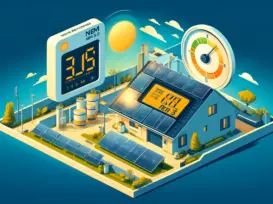Grus Home Energy - solar investment
Maximizing Returns on Solar Energy: Strategies for Smart Solar Investment
Maximizing Returns on Solar Energy: Strategies for Smart Solar Investment
Investing in solar energy has become increasingly attractive in recent years, as the push for renewable energy sources intensifies globally. Solar investments not only contribute to the reduction of carbon emissions but also offer potential economic benefits. The key to maximizing returns on solar investment lies in strategic planning, market research, and an understanding of the incentives available.
Solar energy’s allure stems from its sustainability and the decreasing cost of photovoltaic (PV) technology. Solar panels, once considered expensive, have seen their prices plummet thanks to technological advancements and increased manufacturing scale. With this reduction in cost, solar energy has become competitive with traditional fossil fuels.
Before delving into the solar market, it is essential to research and understand the various investment options available. These range from purchasing individual solar panels to invest in solar farm projects or solar-focused funds. Each option carries its own set of risks and rewards, and the right choice depends on individual investor goals and risk tolerance.
One effective way to invest in solar energy is through the direct purchase and installation of solar panels on residential or commercial properties. This not only decreases or eliminates electricity bills but also improves property value. Many governments offer tax credits, rebates, or feed-in tariffs to encourage solar panel installation, which can enhance the financial returns of such investments.
Investing in solar farms is another avenue for those who prefer a more hands-off approach. Solar farms are large-scale solar installations that generate electricity for the grid. By investing in a solar farm, individuals can benefit from the sale of electricity without the need to manage the physical assets. This option often requires a more substantial initial investment but can generate consistent long-term returns.
For a more diversified approach to solar investment, solar renewable energy certificates (SRECs) and green bonds are financial instruments that can be considered. SRECs are issued for every megawatt-hour of solar energy produced and can be sold on the market, providing an additional revenue stream. Green bonds are debt securities issued by governments or corporations to fund environmentally-friendly projects, including solar developments.
Another key to maximizing solar investments is to keep abreast of technological advancements. Improvements in solar panel efficiency, battery storage solutions, and smart grid technologies can significantly impact the profitability of solar projects. Early adoption of such advancements can give investors a competitive edge.
Monitoring policy changes and market trends is also vital. Government policies can heavily influence the solar energy market, and shifts in incentives or regulations can dramatically affect the viability and profitability of solar investments. Staying informed about international developments in clean energy can offer insights into emerging markets and potential growth areas.
In conclusion, solar investment presents a compelling opportunity for those looking to diversify their portfolios while contributing to a sustainable future. By carefully considering the various investment vehicles, taking advantage of government incentives, remaining current with technological innovations, and monitoring market trends, investors can maximize their solar energy returns. However, it is important to conduct thorough due diligence and, if necessary, consult with financial and solar energy experts to develop a well-informed investment strategy.
©2025 All Rights Reserved. Grus IoT Co.,Ltd.
